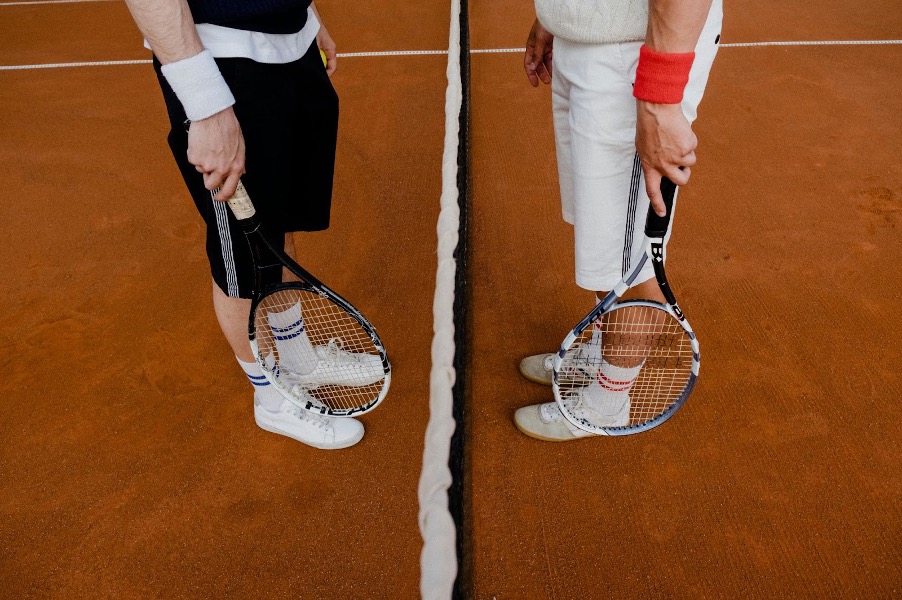Tennis is often seen as a fast-paced, physically demanding sport. But did you know that playing tennis also has a profound impact on education? Beyond the baseline rallies and serves, tennis teaches students lessons that extend far beyond the court. Whether it’s improving mental agility, fostering discipline, or enhancing social skills, tennis has a lot to offer students both in and out of the classroom. So, how does this beloved sport influence academic success? Let’s explore!

1. Boosting Cognitive Skills Through Strategy and Focus
Tennis is often referred to as a “mental chess game” due to the strategic thinking involved. Players need to constantly analyze their opponent’s movements, anticipate their next shot, and adjust their strategy on the fly. This kind of problem-solving sharpens cognitive skills that are crucial for academic performance.
For instance, when a student is working on a math problem, they must think critically and anticipate the next steps, much like a tennis player anticipates an opponent’s return. The mental focus required during a match—whether it’s tracking the ball or calculating angles for a shot—also improves concentration. And let’s be honest, who couldn’t use a little extra focus during a long study session?
Moreover, research has shown that sports like tennis increase neural connections in the brain. These improvements in brain function can lead to better memory retention, quicker learning, and enhanced decision-making skills—all of which are incredibly useful in the classroom.
2. Developing Discipline and Time Management
Mastering tennis requires practice, commitment, and consistency. Students who play tennis learn to manage their time effectively because balancing sports and academics demands a well-structured schedule. This sport teaches discipline—not just to train regularly, but also to improve upon weaknesses, build endurance, and remain resilient after setbacks.
In a school setting, this translates to excellent time management skills. Students accustomed to the discipline of tennis are better equipped to handle deadlines, organize study sessions, and stick to a plan. Managing daily tennis practice alongside exams helps develop solid organizational skills.
When academic pressures mount, especially during thesis writing, it can be challenging to balance everything. A helpful solution is the custom dissertation writing service which provides professional support and allows students to focus on both their academic and extracurricular activities. With these skills in place, students can move forward, honing their problem-solving abilities and sharpening their critical thinking, essential in both tennis and academics.
3. Enhancing Problem-Solving and Critical Thinking
Tennis requires players to adapt quickly, whether it’s reacting to a sudden change in weather, an unexpected serve, or a strong rally from an opponent. This constant need to assess and adapt improves problem-solving skills.
In the classroom, students face similar situations when tackling complex problems or assignments. Just like in tennis, they need to break down a challenge into manageable parts and approach it step-by-step. The critical thinking required on the court—whether deciding which shot to use or how to outwit an opponent—mirrors the thought process required in subjects like science or literature. For example, in a chemistry class, students must think analytically, much like a tennis player reading an opponent’s play during a match.
Tennis also teaches resilience in problem-solving. Not every shot will land where you want it to, and not every strategy will work immediately. Likewise, not every academic challenge is solved on the first try, but the persistence learned on the court helps students keep working until they find a solution.
4. Building Emotional Intelligence and Social Skills
Tennis is not just a solo sport; it requires communication, teamwork (especially in doubles matches), and emotional control. Students who play tennis learn how to handle both victory and defeat gracefully, managing their emotions in high-pressure situations. This emotional intelligence is crucial in both social and academic settings.
How often do we see students frustrated by a tough exam or a difficult group project? Tennis teaches players how to keep cool under pressure, which translates directly into emotional regulation during stressful academic situations. Additionally, the sportsmanship in tennis—handshakes, respect for the opponent, and playing by the rules—fosters social skills that are key in teamwork, group discussions, and collaborating with peers.
In a world where social interaction is increasingly digital, tennis offers a refreshing break, allowing students to engage face-to-face, improve communication skills, and build camaraderie with teammates and opponents alike.
5. Physical Health Leading to Better Academic Performance
Physical health and academic success are more closely linked than you might think. Regular physical activity, like playing tennis, boosts blood flow to the brain, which enhances cognitive functions such as memory and concentration. According to numerous studies, students who engage in regular physical activity tend to perform better academically.
Tennis, with its quick bursts of movement, improves cardiovascular health, coordination, and agility. This improved fitness level also helps students reduce stress and anxiety, common barriers to learning. When students are physically fit and energized, they’re better able to focus during lectures and handle academic challenges with a clear mind.
Additionally, tennis serves as a healthy outlet for stress. Academic life can be overwhelming, especially during exam periods. Hitting the tennis court offers students a break from mental strain, allowing them to recharge, release tension, and return to their studies with renewed focus.
6. Fostering Teamwork and Leadership in Doubles Play
While singles tennis is often a solo endeavor, doubles tennis requires communication, cooperation, and leadership. Players need to work together seamlessly to outmaneuver their opponents. This teamwork can boost leadership qualities, especially when a student takes charge of organizing strategies or guiding a partner through tough plays.
In the academic world, leadership skills are crucial for success in group projects, presentations, and other collaborative activities. Tennis helps students develop these qualities on the court, which they can easily transfer into their school life.
7. Teaching Resilience and Growth Mindset
Lastly, tennis teaches students the importance of resilience. Every tennis player faces defeat at some point. Whether it’s a missed shot or a tough match loss, the sport emphasizes bouncing back, learning from mistakes, and continuing to improve. This is the essence of a growth mindset.
In the classroom, students are also bound to encounter failures, whether it’s a bad grade or a challenging assignment. The resilience built on the court can help students adopt a growth mindset, where they view setbacks as opportunities to learn and grow, rather than as fixed failures.
Conclusion
Tennis is much more than a physical sport—it’s a powerful tool for shaping students’ minds and behaviors. From sharpening cognitive skills and improving focus to fostering emotional intelligence and teaching resilience, tennis offers a wealth of benefits that students can apply directly to their academic lives. By bringing the discipline, strategy, and teamwork learned on the court into the classroom, students are better equipped to succeed, not just in sports, but in all areas of life. So, the next time you pick up a racket, remember—you’re not just playing a game. You’re preparing for success in the classroom and beyond!






